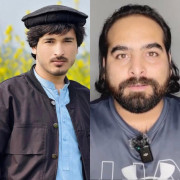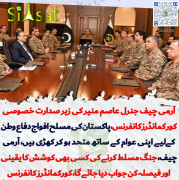A
Admin
Guest
By Bill RoggioDecember 13, 2009 11:27 AM
Senior Pakistani leaders have signaled a willingness to conduct talks with the Taliban, and on the same day the prime minister announced that military operations may be considered in a Taliban-controlled tribal agency.
Prime Minister Yousuf Raza Gilani said the government will talk to the Taliban before it considers launching an operation in the Arakzai tribal agency, while Interior Minister Rehman Malik said he would discuss Taliban offers with political parties that are sympathetic to or support the Taliban.
Gilani indicated that negotiations are on the table and that the government would consider discussing proposals made by Imran Khan, the leader of the Tehrik-i-Insaaf, and the pro-Taliban Jamaat-e-Islami.
"We will first try to convince elements in Arakzai to accept a peaceful resolution," Gilani said, according to Dawn.
Gilani made the statement after he said that the military operation "has finished in South Waziristan, now there is a discussion of taking it to Arakzai agency." Gilani later withdrew his remarks about the South Waziristan operation being completed, and claimed his statement was taken out of context.
Interior Minister Rehman Malik also said the government would consider the proposals made by the Tehrik-i-Insaaf and the Jamaat-e-Islami after he claimed that Hakeemullah Mehsud, the leader of the Movement of the Taliban in Pakistan, had approached the government four times to offer peace talks. Malik said the government rejected the talks and maintained that negotiations could take place only after a Taliban surrender, Daily Times reported. Malik said "the Taliban initiative was a good omen" and he had approached clerics to consider the peace offers.
In the past, the Pakistani government has negotiated with the Taliban under the guise of intermediaries. These arrangements have allowed the government to deny it directly negotiates with the Taliban. The peace agreements in Swat were negotiated with the pro-Taliban front group Tehrik-e-Nifaz-e-Shariat-e-Mohammed [TNSM, or the Movement for the Enforcement of Mohammed's Law]. Similarly, a multitude of peace agreements in North and South Waziristan were negotiated with "tribal elders."
Small-scale operations against the Taliban and allied groups are currently underway by the paramilitary Frontier Corps in the tribal agencies of Arakzai, Khyber, and Kurram. Senior Taliban leaders and fighters under the command of Hakeemullah Mehsud have decamped from South Waziristan to these regions, as well as in North Waziristan, to avoid the current operation.
The military and the government have signaled they are unwilling to enter North Waziristan, where the Haqqani Network and Hafiz Gul Bahadar maintain control, and the western areas of South Waziristan under the control of Mullah Nazir. These three Taliban groups all shelter al Qaeda and a host of Pakistani jihadi groups conducting attacks against Pakistan as well as in Afghanistan.
http://www.longwarjournal.org/archives/ ... z0ZejS90Bq
Senior Pakistani leaders have signaled a willingness to conduct talks with the Taliban, and on the same day the prime minister announced that military operations may be considered in a Taliban-controlled tribal agency.
Prime Minister Yousuf Raza Gilani said the government will talk to the Taliban before it considers launching an operation in the Arakzai tribal agency, while Interior Minister Rehman Malik said he would discuss Taliban offers with political parties that are sympathetic to or support the Taliban.
Gilani indicated that negotiations are on the table and that the government would consider discussing proposals made by Imran Khan, the leader of the Tehrik-i-Insaaf, and the pro-Taliban Jamaat-e-Islami.
"We will first try to convince elements in Arakzai to accept a peaceful resolution," Gilani said, according to Dawn.
Gilani made the statement after he said that the military operation "has finished in South Waziristan, now there is a discussion of taking it to Arakzai agency." Gilani later withdrew his remarks about the South Waziristan operation being completed, and claimed his statement was taken out of context.
Interior Minister Rehman Malik also said the government would consider the proposals made by the Tehrik-i-Insaaf and the Jamaat-e-Islami after he claimed that Hakeemullah Mehsud, the leader of the Movement of the Taliban in Pakistan, had approached the government four times to offer peace talks. Malik said the government rejected the talks and maintained that negotiations could take place only after a Taliban surrender, Daily Times reported. Malik said "the Taliban initiative was a good omen" and he had approached clerics to consider the peace offers.
In the past, the Pakistani government has negotiated with the Taliban under the guise of intermediaries. These arrangements have allowed the government to deny it directly negotiates with the Taliban. The peace agreements in Swat were negotiated with the pro-Taliban front group Tehrik-e-Nifaz-e-Shariat-e-Mohammed [TNSM, or the Movement for the Enforcement of Mohammed's Law]. Similarly, a multitude of peace agreements in North and South Waziristan were negotiated with "tribal elders."
Small-scale operations against the Taliban and allied groups are currently underway by the paramilitary Frontier Corps in the tribal agencies of Arakzai, Khyber, and Kurram. Senior Taliban leaders and fighters under the command of Hakeemullah Mehsud have decamped from South Waziristan to these regions, as well as in North Waziristan, to avoid the current operation.
The military and the government have signaled they are unwilling to enter North Waziristan, where the Haqqani Network and Hafiz Gul Bahadar maintain control, and the western areas of South Waziristan under the control of Mullah Nazir. These three Taliban groups all shelter al Qaeda and a host of Pakistani jihadi groups conducting attacks against Pakistan as well as in Afghanistan.
http://www.longwarjournal.org/archives/ ... z0ZejS90Bq


























